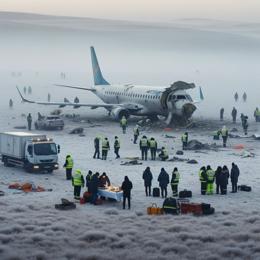Image created by AI
Boeing's Guilty Plea in 737 Max Case: A Controversial Settlement
In a landmark development, aerospace titan Boeing has concurred to plead guilty to fraud charges connected to the two catastrophic crashes of its 737 Max aircraft. The crashes in 2018 and 2019 claimed the lives of 346 individuals and sparked intense scrutiny over Boeing's safety protocols and disclosures.
The US Department of Justice (DOJ), in a recent court document reveal, outlined the terms of the plea agreement with Boeing. The arrangement stipulates that Boeing pays a disciplinary fine of $243.6 million. Additionally, to bolster its dedication to compliance and rectify safety program deficits, Boeing is compelled to invest upwards of $455 million.
Boeing will also endure a three-year probationary monitoring by an independent third party to evaluate and validate its safety and quality measures. In its own press statement, Boeing acknowledged the preliminary resolution with the DOJ, emphasizing the pending finalization and acceptance of the deal's detailed terms.
Critics, including lawyers who represent some of the crash victims' relatives, have lambasted the plea agreement. They argue that it insufficiently acknowledges the magnitude of the tragedy facilitated by Boeing's conduct. Paul Cassell, among the legal representatives for the victim’s families, has criticized the deal as overly lenient, masking the gravity of Boeing's felonious actions and the resultant heartbreaking loss of lives.
Notably, the plea deal confines itself to Boeing's culpability for the 737 Max crashes solely and does not pertain to other safety events involving Boeing's aircraft, such as the recent trouble with Alaska Airlines flight 1282.
While the settlement mandates federal court authorization, if sanctioned, Boeing’s admission of guilt could have vast repercussions. The corporation risks being disqualified from American government contracts, which make up approximately 40% of its business earnings. However, the company does have the opportunity to pursue exemptions to retain its government contracts. This is not an unprecedented scenario; in 2003, the US Air Force overrode a prohibition on Boeing competing for contracts, illustrating potential leniency towards the aerospace giant.
The DOJ's decision to advocate for a guilty plea follows its May declaration, denoting that Boeing had failed to uphold its part of a 2021 deferred prosecution agreement linked to the 737 Max disasters. This initial arrangement provided that Boeing would sidestep criminal charges by reconciling with the regulatory body, paying a substantial fine, and adhering to specific compliance measures.
Included in this mea culpa, Boeing conceded that it had indeed misled the Federal Aviation Administration regarding a pivotal stabilization software called the Maneuvering Characteristics Augmentation System (MCAS), which was implicated in both air crashes.
The now-public plea deal is the current installment of the ongoing saga of Boeing’s 737 Max, serving as a stark reminder of the importance of corporate responsibility and regulatory oversight in the aviation industry.










